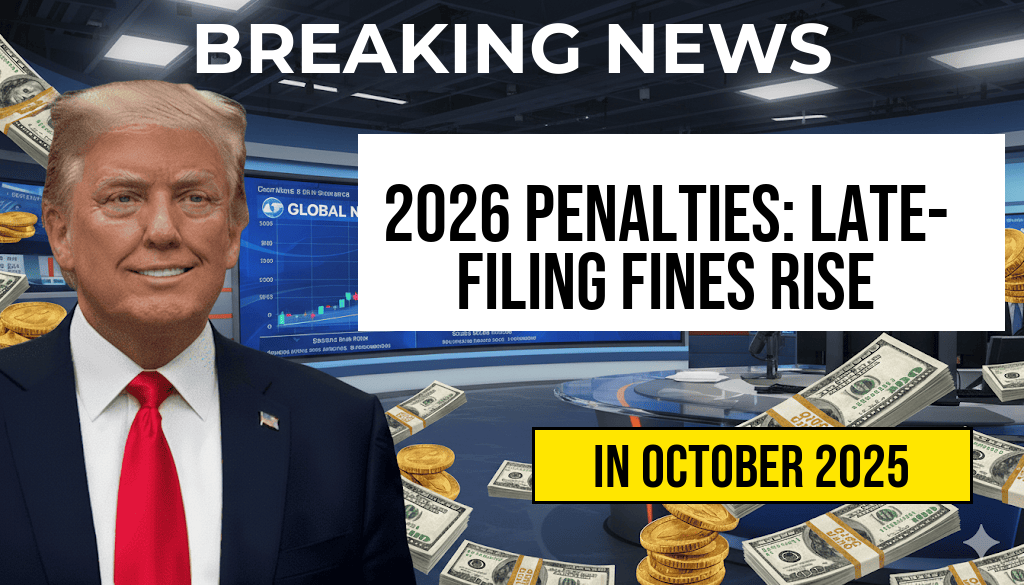Taxpayers should brace themselves for significant changes in the realm of late-filing penalties, as new regulations set to take effect in 2026 will increase fines substantially. The adjustments are part of broader tax reforms aimed at enforcing compliance and ensuring timely submissions. Experts estimate that these penalties could add hundreds of dollars to your tax bill if returns are not filed on time. With the IRS focusing more on compliance, understanding these upcoming changes is crucial for taxpayers who want to avoid unexpected financial burdens.
What to Expect from the New Penalties
The IRS has proposed a series of adjustments to the existing penalty structure, which currently imposes a fine of 5% of the unpaid taxes for each month a return is late, up to a maximum of 25%. Starting in 2026, these penalties are projected to increase dramatically, burdening taxpayers with fines that could significantly impact their financial planning.
Details of the Proposed Changes
- Increased Penalty Rates: The new structure could see penalties rise to 10% of unpaid taxes for each month a return is late.
- Maximum Penalty Cap: The cap may also be adjusted, potentially extending beyond the current 25% limit.
- Additional Fees: Taxpayers may face additional fees for each subsequent late filing, compounding the financial impact.
Implications for Taxpayers
The increased penalties will likely have a ripple effect on individual taxpayers and small businesses. Those who typically file their taxes late or who are unprepared for the filing season may find themselves facing much larger bills. Financial advisors are urging clients to take these changes into account while planning their tax strategies.
Financial Planning Tips
- Prepare Early: Start organizing your financial documents well before the filing deadline to avoid last-minute rushes.
- Consider Professional Help: Hiring a tax professional can help ensure that all filings are accurate and submitted on time.
- Stay Informed: Regularly check the IRS website or consult financial news outlets for updates on tax regulations.
Comparing Current and Future Penalties
| Penalty Type | Current Rate | Future Rate (2026) |
|---|---|---|
| Monthly Penalty | 5% of unpaid taxes | 10% of unpaid taxes |
| Maximum Penalty | 25% of unpaid taxes | Potentially higher than 25% |
| Additional Fees | None | Possible additional fees for late filings |
Why the Changes Are Happening
The IRS has emphasized the importance of timely filing and payment to ensure the effective functioning of the tax system. Delays in filing and payment can hinder government operations and lead to budgetary shortfalls. By increasing penalties, the IRS aims to promote compliance and discourage procrastination among taxpayers. This shift mirrors trends in other countries where stricter penalties have resulted in improved compliance rates.
Advice from Tax Professionals
Tax experts are advising individuals and businesses to reassess their filing processes in light of these changes. “Being proactive is key,” says John Adams, a certified public accountant based in New York. “Understanding the new penalties can save taxpayers a lot of money in the long run.”
Resources for Taxpayers
For those looking to educate themselves further about these changes, several resources are available, including:
As the 2026 deadline approaches, staying informed about these changes will be crucial for all taxpayers. Understanding the implications of increased penalties can help individuals and businesses alike manage their finances more effectively and avoid unexpected costs.
Frequently Asked Questions
What are the new penalties for late filing in 2026?
The new penalties for late filing in 2026 are expected to increase significantly, potentially raising your tax bill by hundreds of dollars compared to previous years.
How will these penalties affect individual taxpayers?
Individual taxpayers could face higher late-filing fines, which may lead to increased overall tax liabilities and financial strain if they miss the filing deadline.
When do the increased penalties take effect?
The increased penalties will take effect in 2026, so taxpayers should be aware of these changes when preparing for their tax returns in that year.
What can taxpayers do to avoid these penalties?
To avoid the increased penalties, taxpayers should file their tax returns on time, seek assistance if needed, and stay informed about the upcoming changes in tax laws.
Are there any exceptions to the new penalty rules?
While specific exceptions have not been detailed, it’s crucial for taxpayers to consult with a tax professional to understand any potential exceptions or relief measures that may apply to their situation.







